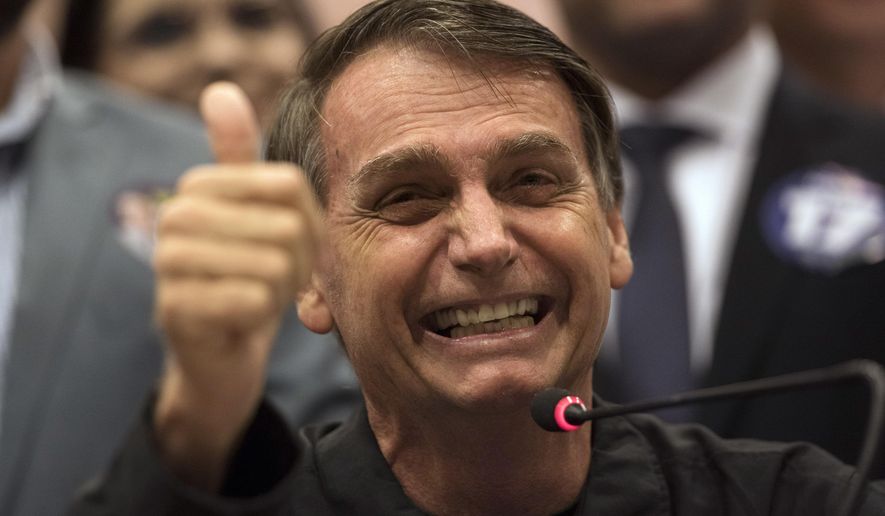OPINION:
Here’s a remarkable fact: More people have been murdered in Brazil since the turn of the century than have been killed in the Syrian Civil War. That baleful reality goes a long way toward explaining the remarkable political events over the past month in the largest nation in South America over the past month.
Brazil’s leading candidate for president nearly became one of those when he was stabbed at a political rally in early September. Jair Bolsonaro lost nearly half of his blood in the attack, and nearly died.
Fully recovered now, Mr. Bolsonaro won decisively in the first round of the country’s national election held last Sunday. The presidential candidate of the upstart Social Liberal Party — invariably described as “far right” or “ultra conservative”— took 46 percent of the vote in the first round. The second place finisher, Fernando Haddad of the left-wing Workers’ Party, couldn’t manage even 30 percent. Mr. Bolsonaro is in pole position to take the presidency in the runoff election, scheduled for October 28. Mr. Haddad, the former mayor of Sao Paolo, seems to have modest prospects.
Mr. Bolsonaro, like Rodrigo Duterte, the president of the Philippines, ran as Mr. Tough Guy, a man capable of cleaning up a messy country. Just as in the Philippines, a fed-up public responded favorably.
A military veteran and member of Chamber of the Deputies, representing Rio de Janeiro since 1991, Mr. Bolsonaro stressed above all else his determination to bring down Brazil’s hideous murder rate. Brazil is on pace to surpass the 63,000 slayings last year. He has not only promised to implement tougher law enforcement, but wants more Brazilians to carry guns to protect themselves. This is a sentiment that American supporters of the Second Amendment will appreciate, civilian ownership of guns as a bulwark against tyranny, a sentiment with widespread appeal in a country with a history of dictatorships, some more brutal than others. “Dictatorships only take root after disarmament programs,” Mr. Bolsanaro observes.
It’s not only the murder rate that has Brazilians outraged by the status quo. He wants to take on high-level crime as well, a serious concern in any country as corrupt as Brazil. A decade-long scandal has revealed endemic graft and cronyism at the top. Workers’ Party’s “Lula,” who led Brazil as president from 2003 to 2011, is currently serving a 12-year prison sentence for corruption. Dilma Rousseff, another president from the Workers’ Party, was impeached in 2016 for financial chicanery. Michael Temer, the incumbent president, has been accused of corruption, too. Corruption is inevitably catching.
The Brazilian economy, smothered by decades of Workers’ Party mismanagement, has grossly underperformed. The Heritage Foundation has observed that “Brazil’s economic freedom score is the 153rd freest in the 2018 Index with a steep drop in fiscal health and declines in labor freedom, business freedom, wild government spending, and lack of government integrity overwhelming some improvements in judicial effectiveness and property rights. Brazil is ranked 27th among 32 countries in the Americas, and its overall score is below the regional and world averages.”
The results of this management have been predictable and plain to see. Brazil suffered through a brutal recession between 2014 and 2017, and even now in its “recovery,” growth is anemic. Mr. Bolsanaro has pledged to liberalize the economy, including privatizing some inefficient state-owned enterprises. It’s worth noting that he’s a late convert to the free market cause; while in the Council of Deputies, he voted as a reliable statist. But his appointment of a University of Chicago trained economist as his running mate signaled a new, more economically libertarian Jair Bolsonaro.
On policy, there is much to recommend Mr. Bolsonaro, especially given that his opponent is a Workers’ Party candidate whom Brazil can ill afford. But there’s more to leadership than proposing and enacting even the right things. Character counts, too. Mr. Bolsonaro does not seem to have an excess of that. Crude vulgarity abounds in his speech. He once told a legislator that he would never rape her because she’s “too ugly.” He has made various remarks demeaning to racial minorities and homosexuals, and spoken favorably of Brazilian dictatorships of the past.
He promises to make Brazil great again. He has the slogan if not the record to inspire confidence that he can do it. “Let’s be proud of our homeland again,” he says. He’s likely to get his opportunity soon to make Brazil worthy of pride.




Please read our comment policy before commenting.